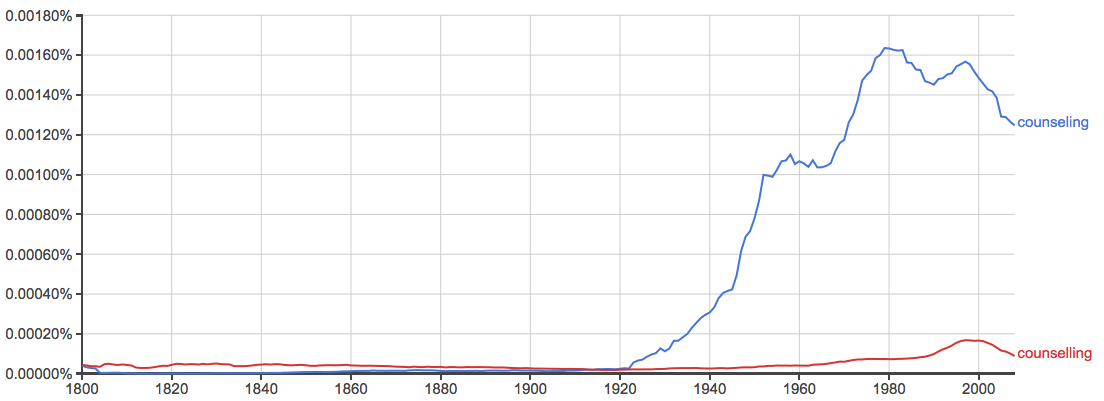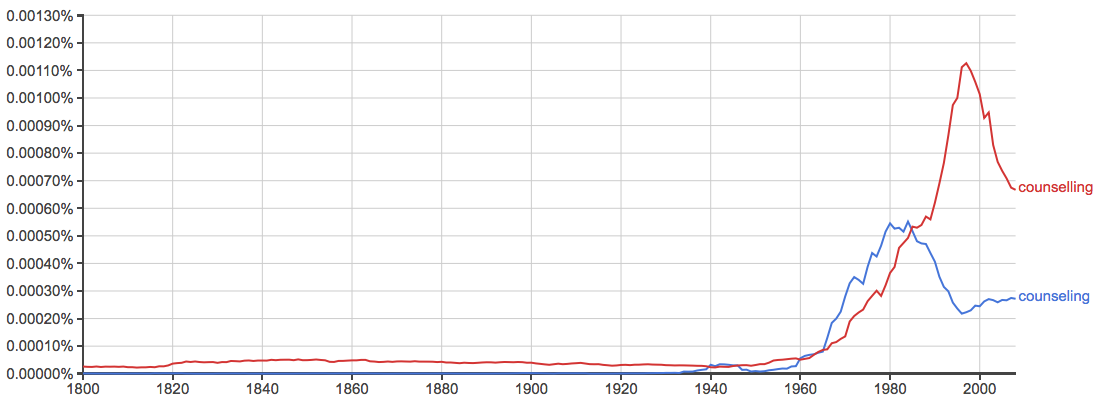Spelling differences in American and British English are widespread and well-documented.
From consonant doubling to -ise and ize suffixes, American writers and British writers are likely to spell many common words differently, even when these writers may be referring to the same thing.
Counseling and counselling are two spelling variants of the same word. Each language community prefers a different spelling. While this might be a confusing difference for international therapists, most of us only need to consider who our audience is before deciding which version to use. Continue reading to learn more about this word.
What is the Difference Between Counselling and Counseling?
In this post, I will compare counselling vs. counseling. I will use each of these words in example sentences, so you can see how they appear in context.
I will also show you how to use a mnemonic device to easily choose counseling or counselling.
When to Use Counseling
 What does counseling mean? Counseling is a verb. It is the present participle conjugation of to counsel, which means to give guidance.
What does counseling mean? Counseling is a verb. It is the present participle conjugation of to counsel, which means to give guidance.
For example,
- The master cake decorator is counseling his young protégé in the ways of cake decorating.
- “For years, I have been counseling you to avoid giving straight answers to the press,” said the politician’s media coach.
Counseling is also a gerund, which is a verb that can function as a noun in sentences. Counseling means guidance or a type of therapy as a noun.
Here are some example sentences,
- Jill goes to the clinic each week for grief counseling.
- Group counseling can be an effective delivery tool for social skills training for adolescent boys.
- The late Roger Ailes ran Fox News for two decades, all the while counseling Republican politicians on their careers — part of his previous professional life. –The Washington Post
When to Use Counselling
 What does counselling mean? Counselling is an alternative spelling of the same word. Where counseling is used in American English, counselling is used in British English.
What does counselling mean? Counselling is an alternative spelling of the same word. Where counseling is used in American English, counselling is used in British English.
- Counselling and other psychological therapies can do more harm than good if they are of poor quality or the wrong type, according to a major new analysis of their outcomes. –The Guardian
The charts below show this usage trend in both American and British English, respectively.
American English:

British English:

These charts aren’t scientific, but they are accurate enough to illustrate the British preference for counselling over counseling and an American preference for the opposite.
Interestingly, counseling was more common for a brief period in the 20th century, before counselling regained its current, commanding lead.
Counselling is used exactly the same way as counseling in sentences. Here are some examples,
- It took years of counselling for Amanda to get over the loss of her sister.
- When counselling children, it is important to remember that their developmental level is not as high as yours.
This same American, British preference applies to the words counselor and counsellor.
Trick to Remember the Difference
Counseling and counselling are spelling variants of the same word. The difference between them comes down to your intended audience:
- Americans prefer counseling.
- Those who use British English are used to seeing counselling.
Since counselling has an extra L, and the British city of London starts with an L, this letter will be your clue that counselling is the British spelling of this word.
Summary
Is it counselling or counseling? Counseling is a verb that means giving guidance or therapy. It can also be used as a noun, where it refers to this guidance or therapy.
- Counseling is an American English spelling.
- Counselling is the British English spelling of the same word.
Contents
